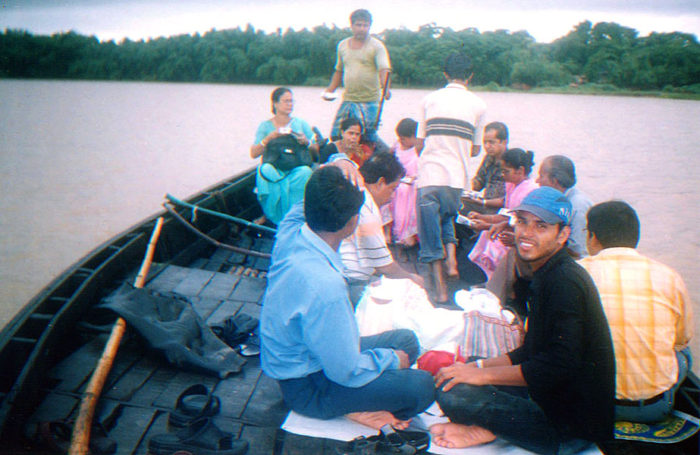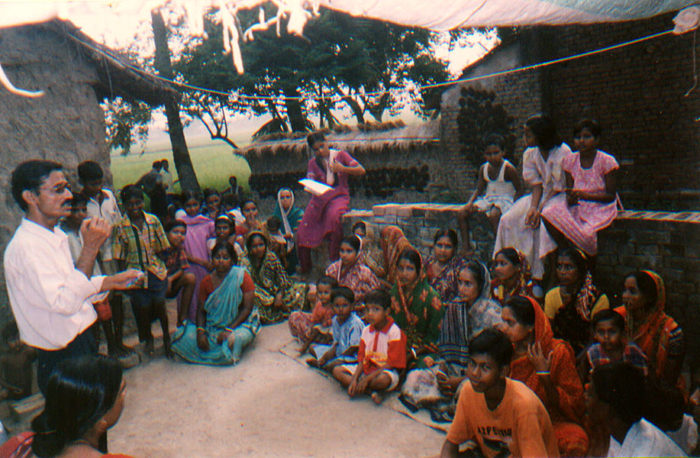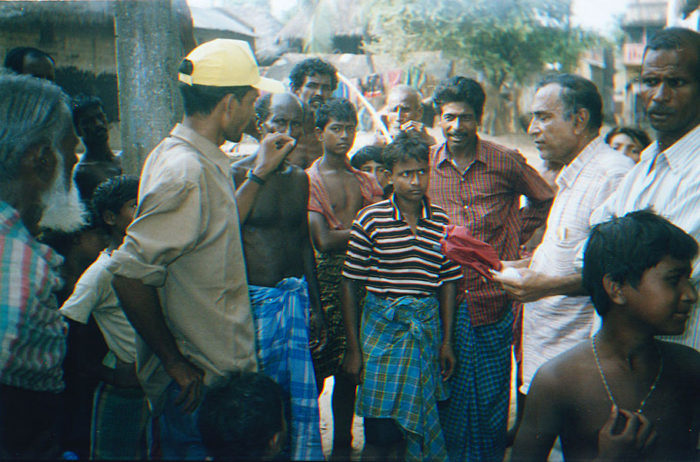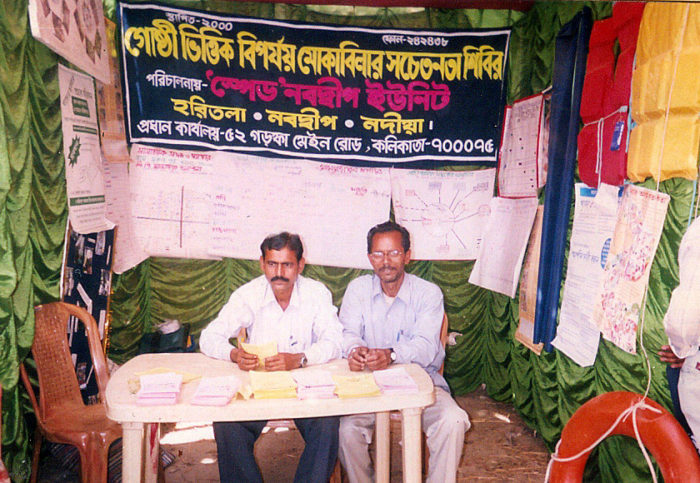What SPADE did in Nabadwip?
SPADE had initiated its field level activities from Nabadwip in the District of Nadia. SPADE’s intervention in Nabadwip was a consequence of a devastating flood in 2000.
Nabadwip is located at the confluence of the Bhagirathi and Jalangi rivers. Nabadwip is famous for its handloom products and the traditional Jamdani Saree of Nabadwip has been popular in domestic markets since time immemorial. The whole area is very much flood-prone and flood is almost a yearly event here. But the flood of 2000 broke all its past records in terms of severity and scale of devastation. There are many instances of families who, in search of high altitude places, had to move 4 or 5 times, had to live without food and were forced to drink contaminated water before the relief arrived. Nabadwip rural and urban areas were submerged under a record 11 feet of water. More than 70% of Nabadwip’s population was stranded. Huts were washed away and the homeless were moved to temporary shelters like school buildings. 18 people lost their lives in Nabadwip and about 4,915 looms have been affected by the rain. The whole area was waterlogged. Vidyasagar College in Nabadwip was listed as one of the higher education centers that were badly damaged.
During this period, SPADE, with active support of OXFAM came forward to participate in the relief distribution activities among the distressed villagers in Mahishura GP of Nabadwip. SPADE personnel stayed there for few days to perform the assigned tasks and thus a rapport was built with the flood victims. Some comments of those victims were like “…you will return back to Calcutta after your job is over, but we shall be right here with the same destiny of suffering and hardship due to flood year after year…” really initiated some serious thoughts regarding doing something which would create a sustainable impact on these people. This line of thinking actually gave birth to the philosophy of community participation and involvement in the whole gamut of flood preparedness and thus to minimize the flood damages as far as practicable. So, in the process, the Project, Community Based Disaster Preparedness (CBDP) took shape with the other Inter Agency Group partners.
Surveys was conducted in Mahishura and Fakirdanga-Gholapara GP and several Linkage Meetings with the GP Members and also with the local influential persons were organized by SPADE to identify what exactly is needed to reduce vulnerability of the rural poor and to make them prepared to face any eventuality. It was evident that the economic vulnerability was the predominant one and it was at the centre of all miseries and sufferings of the people. So, a decision was taken to promote Community Based Organizations (like Self Help Groups, Clusters, Federations) to organize the most vulnerable sections of the community. Hence, SPADE personnel, with the active support of the respective GPs, started promoting Self Help Groups (SHGs) in full swings with a view to organize the village women in small groups in various booth areas. In November, 2000, SPADE first formed some SHGs in Mohisura GP and later on these activities were replicated at Fokirdanga GP. Through these SHGs, the poor women started to save small amount of money individually and took loan on priority basis without any outside financial help.
Hence, from 2000 onwards, SPADE began to consolidate its focus on two major themes: Micro-finance and Disaster Management including Community Based Health Promotion wherein SPADE is now a prominent player in the state and beyond – being a multifaceted organization providing field facilitation, documentation, communication, capacity building, partnerships and advocacy. Gradually SPADE proliferated its activities from Kolkata to three other districts and now has field offices at Nadia, Murshidabad and Malda.
Based on the felt need in some operational areas SPADE has identified few grassroots level organizations having good rapport with the community and hence operated in those areas through these Self Help Promoting Institutions (SHPIs). So far, SPADE has promoted two Federations – one in Nabadwip and another one at Kandi federating the Self Help Groups of the respective areas. These Federations are not only constituted but also managed and owned by the rural women. Besides providing Capacity Building support for managing Self Help Groups, SPADE also took the initiative to involve the SHG members in Community Based Disaster Preparedness, Flood Early Warning Advocacy, Community Mobilization for Polio Eradication, Routine Immunization, Under-3 Child Care and Community Based DOTs Program. These involvements of the SHG members’ altogether have enhanced the capacity and strength of the network within the operational areas.
Also, SPADE has initiated livelihood-oriented interventions in its operational areas so as to eradicate poverty and reduce vulnerability of the community. SPADE has provided and also is providing support as a Resource Center to organizations like –
- Oxfam – Kolkata,
- Action Aid India – Bhubaneswar,
- Irrigation and Waterways Department – Government of West Bengal,
- UNICEF – Kolkata,
- CARE – West Bengal,
- NABARD – Kolkata Regional Office,
- Panchayet & Rural Development Dept – Government of West Bengal,
- CARITAS – Germany,
- Women Development Undertaking – Govt. of West Bengal,
- UNDP, etc.
Major activities of the organization are –
- providing Capacity Building Support in areas like Self Help Group Promotion & Facilitation, Cluster, Sub Cluster and Federation Formation & Management,
- Quality Assessment of SHGs, Clusters, etc.,
- Income Enhancement Planning for the SHG Members,
- Promotion & Management of Micro Finance Institutions,
- Community Based Disaster Preparedness,
- Micro Planning (Rural & Urban PLA/PRA), etc.
Major on-going projects are –
- C-DOT,
- Polio Immunization,
- RI,
- U3 Child Care,
- HIV/AIDS Awareness Promotion among the Youth and SHG members in four districts (Malda, Murshidabad, Nadia, North 24 PGs.) of West Bengal as a partner of UNICEF and WBSAP&CS,
- Promoting and Nurturing Self Help Groups among marginalized communities like Sex Workers, PLWHAs, etc.
Also, SPADE is acting as an authorized monitor for CAPART projects and was engaged with few District Rural Development Agencies as District Technical Agencies. Undoubtedly, during the last decade SPADE has established itself as a major Capacity Building Institution that facilitates the poor and marginalized communities to form and manage institutions of their own.









